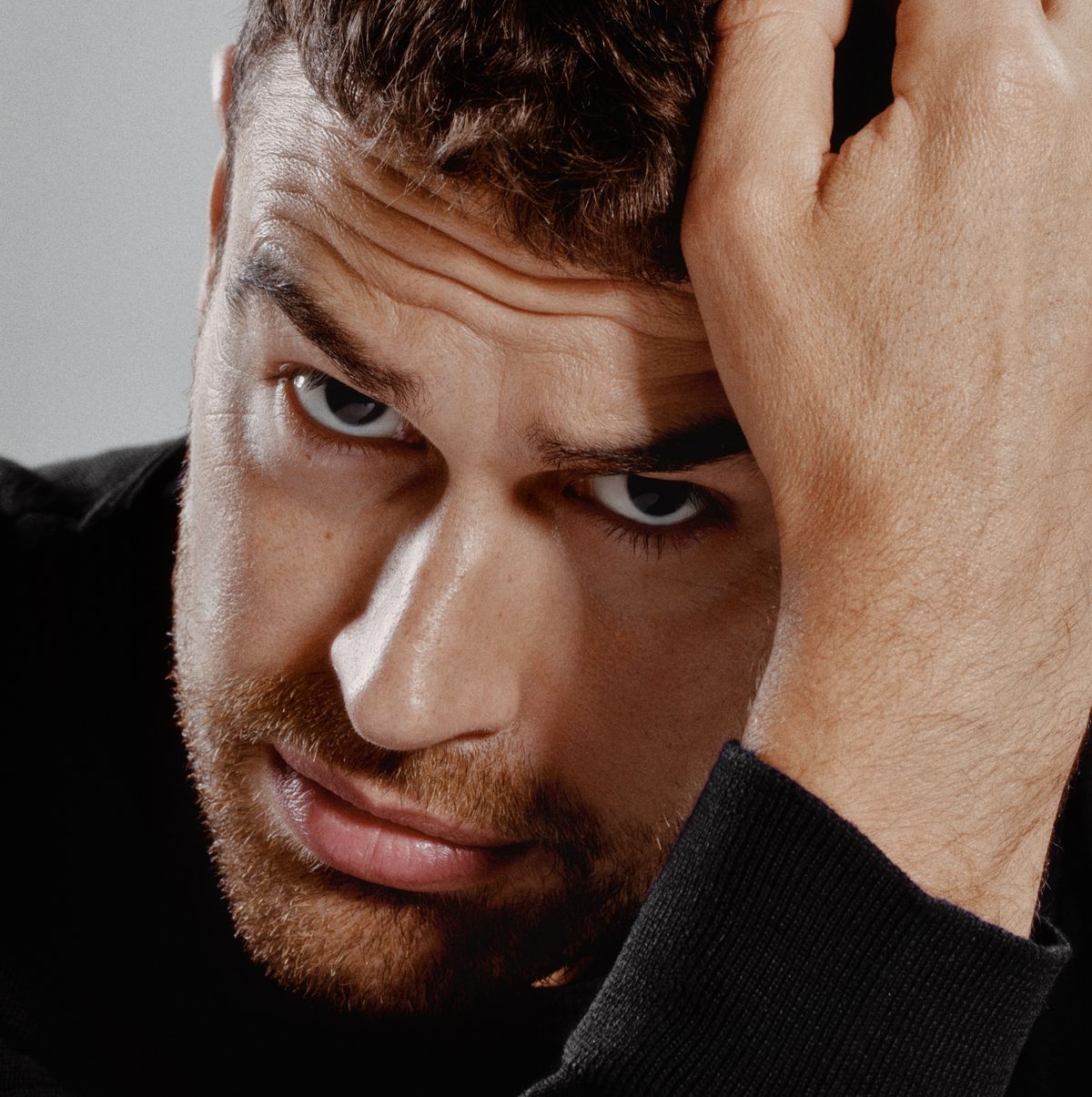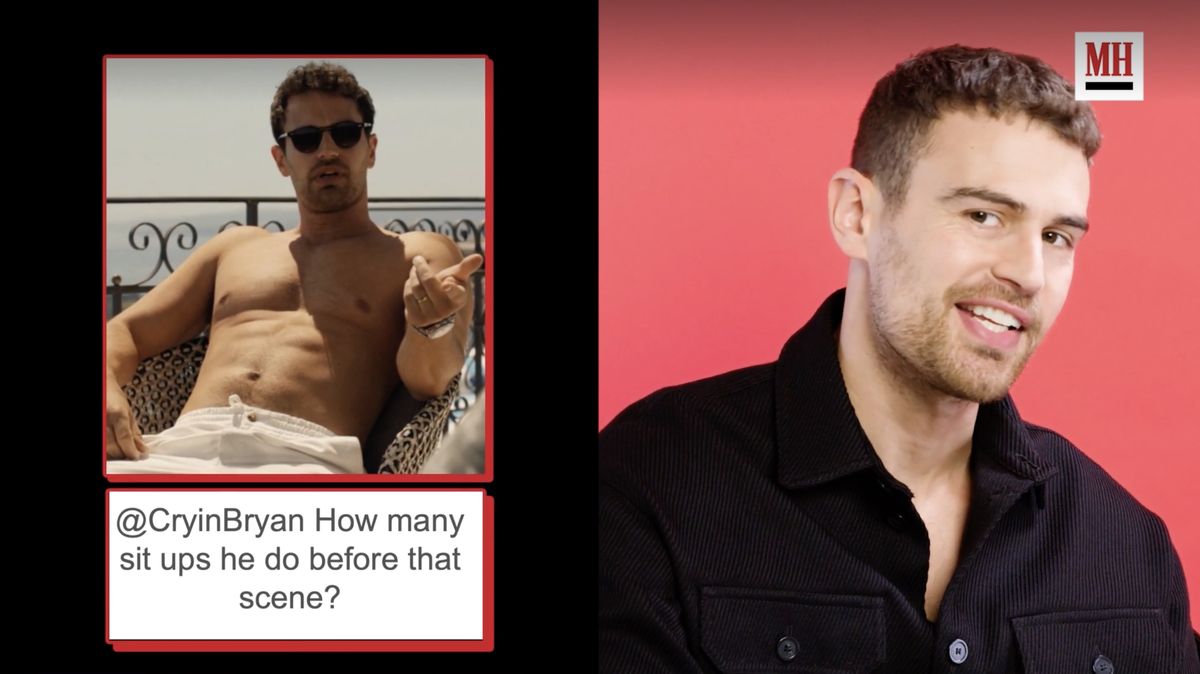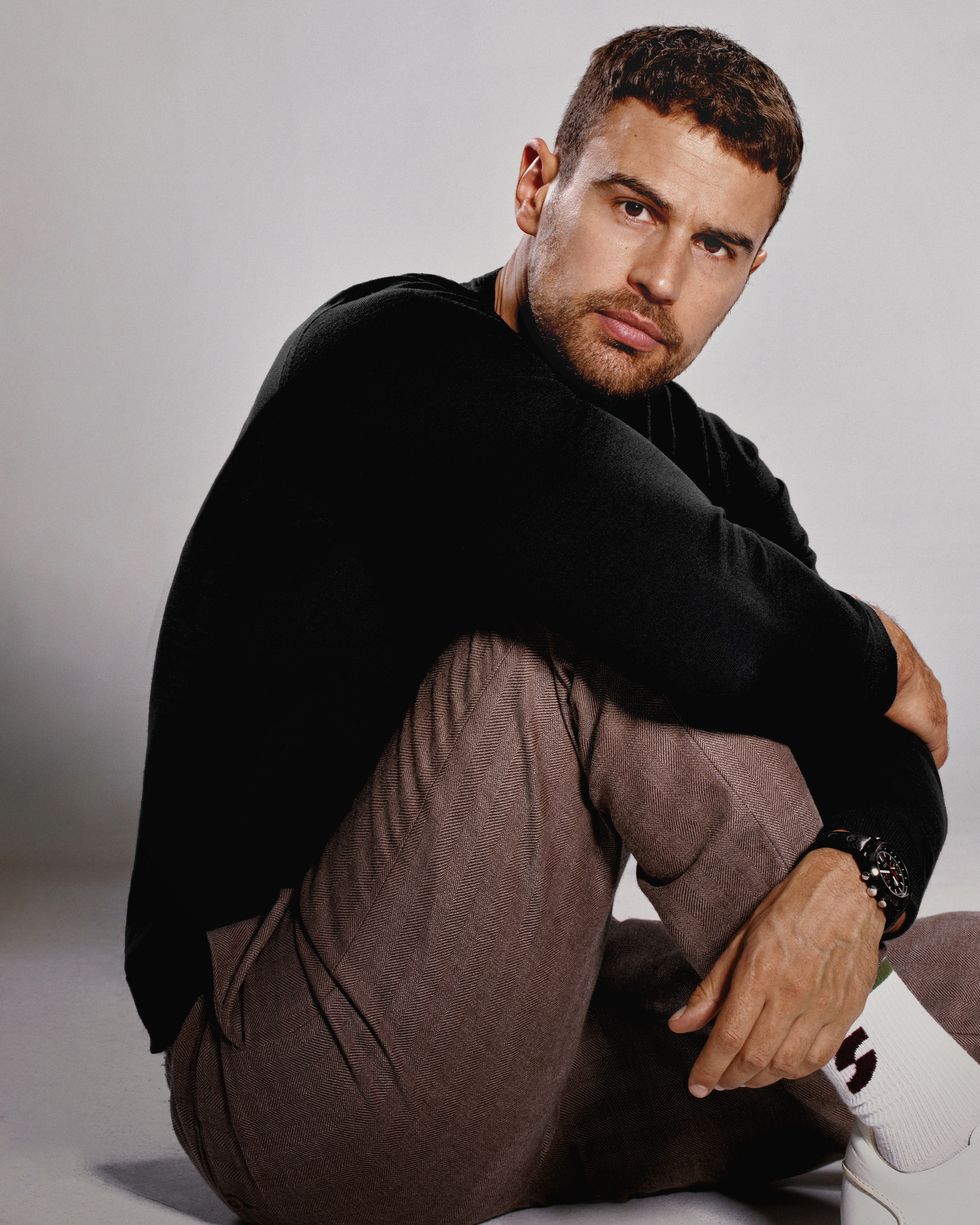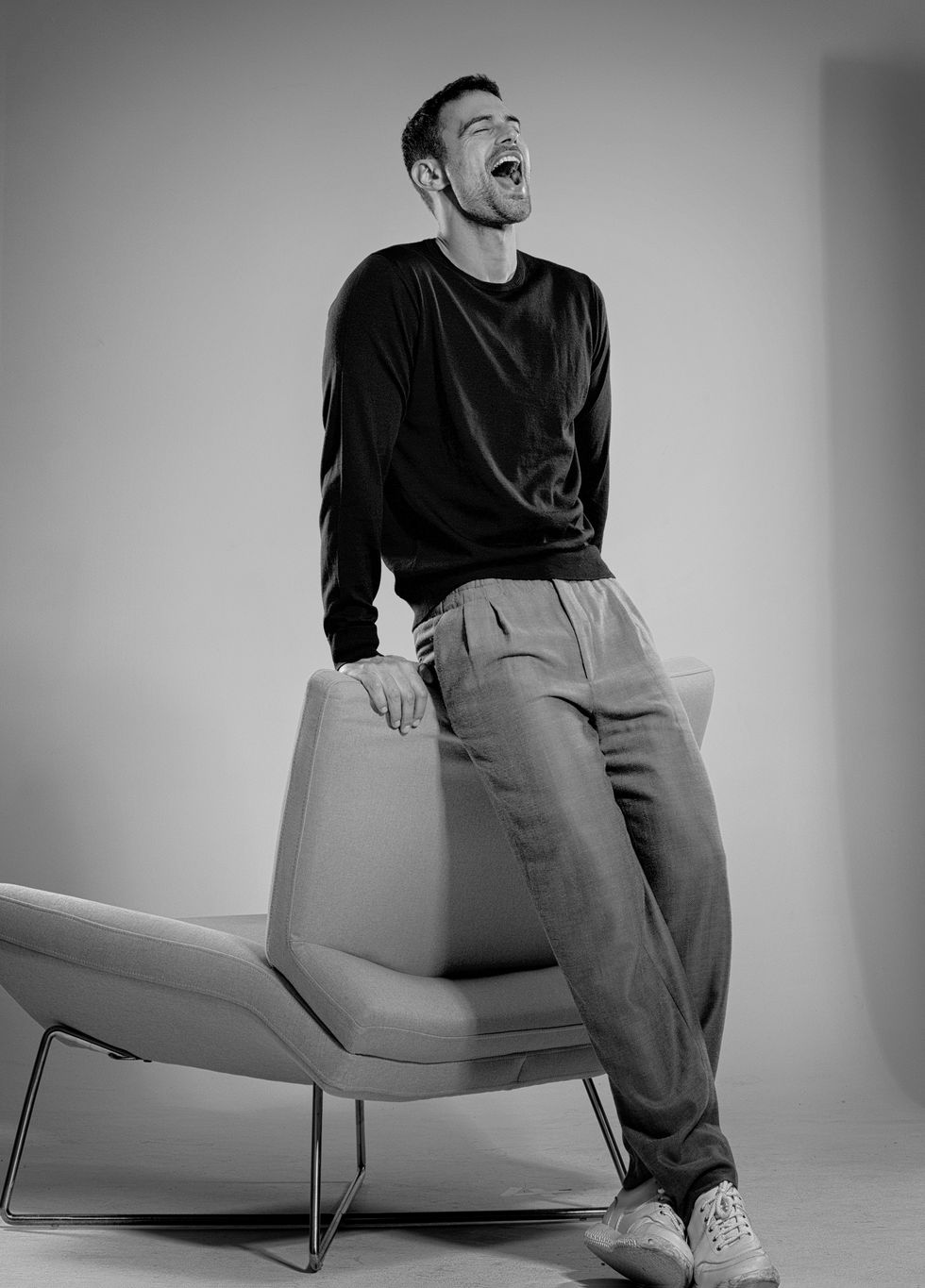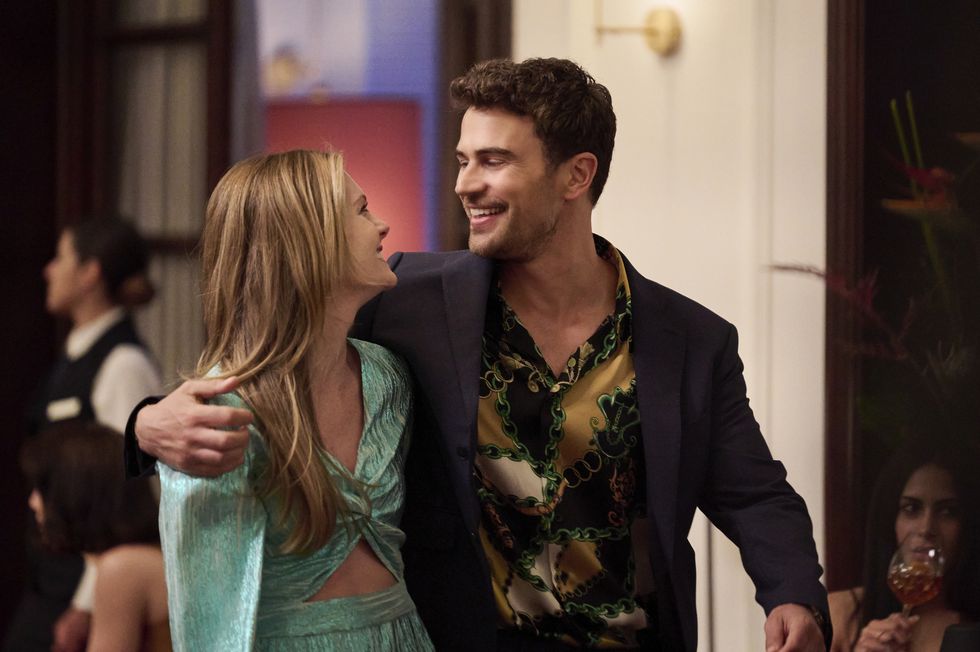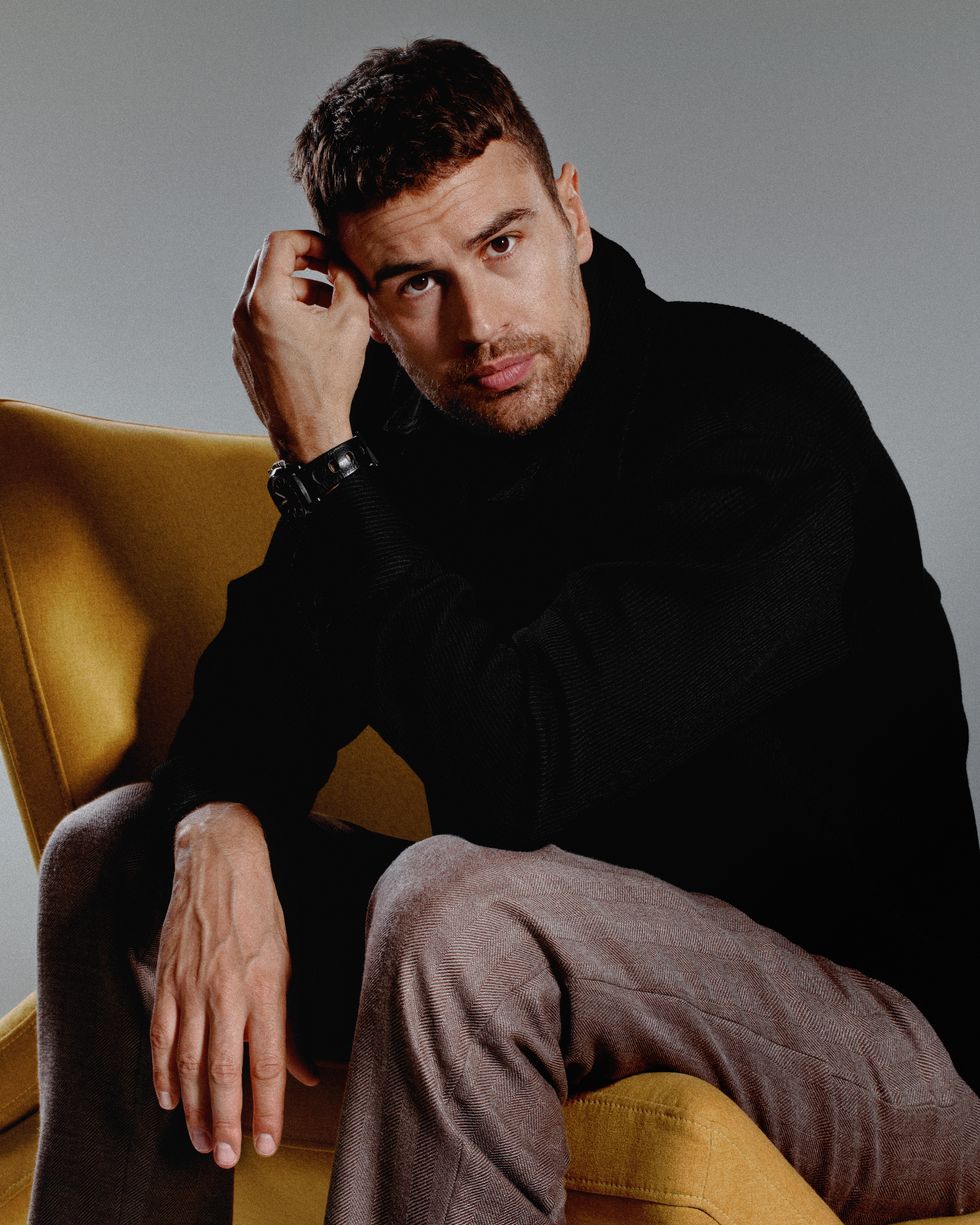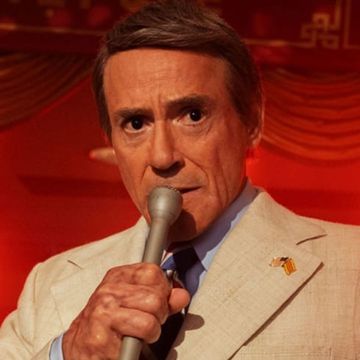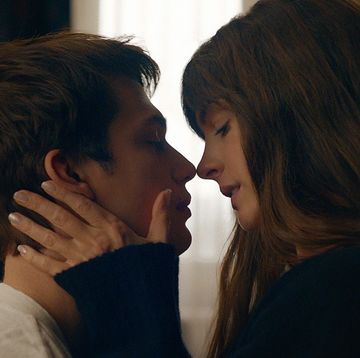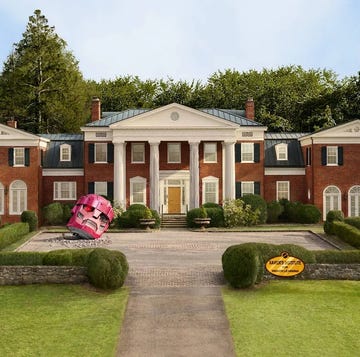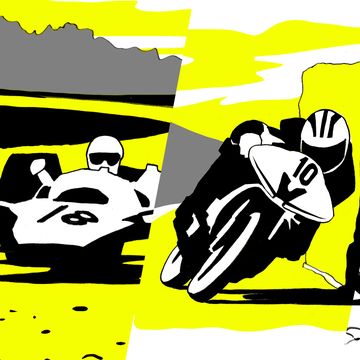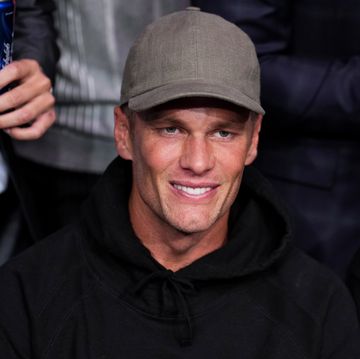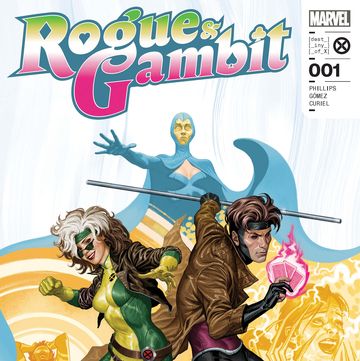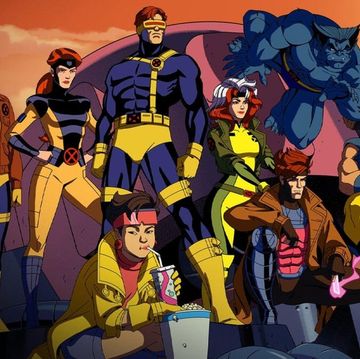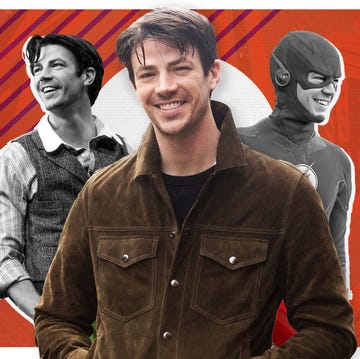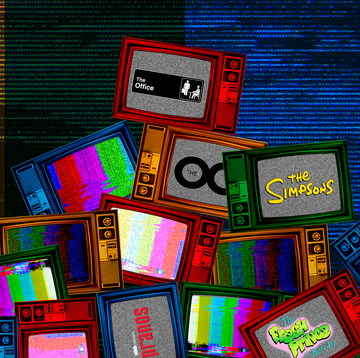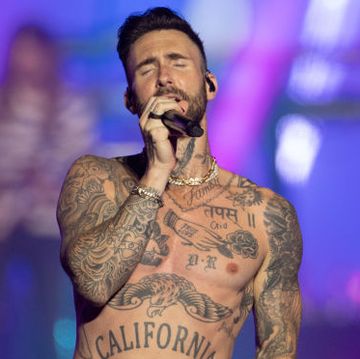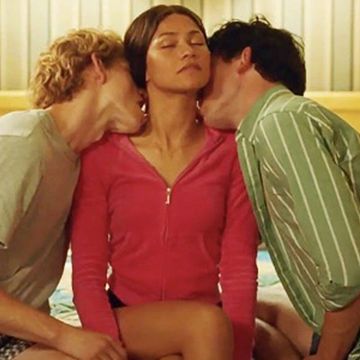WHEN YOU WATCH Theo James in Season 2 of The White Lotus, you get the sense that he's big—a big personality who drives almost every scene he's in, yes, but also just a large, physically imposing man. You can attribute that to the 37-year-old British-born actor making it a point for his character, Cameron, who he calls a "pretty abhorrent" finance bro, to have a constant desire for dominance.
Cameron rarely sits still; he's always got his hands on someone's shoulders, always got his hands around someone's neck, always got his hands...somewhere. He's also always eating, always drinking, and always causing trouble. In any given moment, Cameron threatens to consume anything and everything within a five-foot radius. "I wanted him to represent the animal in a way. He's like a gorilla," James says on an early December afternoon in midtown Manhattan. "I wanted that to be metaphorical, but also semi-literal in places," he says. "On one hand, it's affectionate, but it's also part of his need for dominance and control."
James is a tall man—about six-feet flat—but the way he excels at dominating his scenes, you could convince yourself he's half a foot bigger. He leaned into that physicality early in his career as the male lead in action-heavy movies like Divergent and later entries in the Underworld series. But since the former franchise fizzled out and the latter came to a natural conclusion, James has since refocused his energy. He's had four other projects in 2022: acting in HBO's series adaptation of The Time Traveler's Wife (which was cancelled after one season), the subversive sci-fi thriller Dual, and the regency romance Mr. Malcolm's List, and producing the Netflix docuseries Pepsi, Where's My Jet?. These are projects that are made on a smaller scale than his action franchises of past, and that offer more opportunities for flexibility and variety.
Much like writer-director Mike White's hit first season of The White Lotus, the second go-around has dominated the pop culture conversation. And after Season 1 saw stars like Murray Bartlett, Jake Lacy, and Sydney Sweeney get much-deserved career boosts, it's fair to wonder if James might have his eye on taking a second crack at that big-budget franchise space he once occupied. The answer? A resounding no. "I feel doing this kind of work is definitely more fulfilling," he says, looking off into the distance introspectively with his hand tracing the slight scruff of his chin. "The older—and achier—I get, the more I’ve realized that it's got to be about enjoying it in the moment, because life's too short."
Life is definitely short. And that fact is hammered home when watching The White Lotus, a series where so much happens in the span of six or seven episodes that viewers almost—almost!—forget that at the end of the day, someone's going to wind up dead. As the season comes to a close, we talked to James about his experience checking into TV's most seductive series.
MEN'S HEALTH: When you first got involved with The White Lotus, was Cameron always the character you wanted to play?
THEO JAMES: It was always Cameron. I think one thing they were very keen on with Cameron—and Mike and I evolved this—was that he needed to be charming. He's such a prick, really, that without charm he becomes very unlikable. He is unlikable, of course, because he's doing all the horrendous things that he does. But if you bring an element of charm, at least he's the kind of man you want to hang around with. That was very clear from the beginning.
MH: What's the key for bringing that charm to a character who's otherwise a jerk?
TJ: I wanted him to laugh easily, to be loose, to not be affected or bothered, not be too terse or angry. He's quite dry occasionally as well. I wanted to bring out in him some sense of humor. I just wanted him to be a good-time guy—be the life and soul of the party, pushing the energy of the scene forward, for better or worse.
MH: How much of Cameron's physicality—the way he puts his hands on Ethan's shoulders, or his arm round Daphne's neck—is decided on the spot?
TJ: All of that is really made on the spot as you begin to feel like you are the character. I always feel that during the first couple days of filming, you're trying to figure out who this person is. You're trying to get them into your skin a bit. Sometimes that can happen like that, and sometimes it takes longer. I knew from the first audition—even from just reading the scene—who he was because I've met versions of that man. And there are parts of him that are in me; in my better moments, I can have that good-time energy. I wanted to link that to parts of my own personality.
MH: Cameron seems to be a multi-millionaire, if not a billionaire. Did any real-life one-percenters influence the character?
TJ: I based it off a mixture of people. I based it partly off of a university friend who used to work for Goldman Sachs. There are elements of his personality in Cameron, like the way he spends money. The more devious side [of Cameron] is partly based off of someone I knew for a period of time years ago who worked for a massive hedge fund—the way that man operated around wealth, but also his views on gender and masculinity. In a way, Cameron is quite old school. As a result, I think he's confused to be in this new world that he's living in. He's a bit of a dinosaur in some ways.
MH: Is it difficult for you to sympathize with a character who has such antiquated, sometimes noxious, world views?
TJ: Yeah, it's tricky. It's suggested that [he and his wife Daphne] are libertarians, or that they don't vote, or at least don't vote in the way you would want to—which is a tough pill to swallow. I'll be honest: I remember doing some of the scenes, and me and Meghann [Fahy, who plays Daphne] would be like, “Oh god, I feel like part of my soul has been destroyed.” But the thing about fiction is that you need to be able to play characters on multiple ends of the spectrum. The good thing about Mike's writing is it doesn't all have to be one worldview. They don't vote, which is really dumb. But Mike also has a commentary about the other couple [played by Will Sharpe and Aubrey Plaza] and their neoliberal views.
MH: Daphne refers to Cameron’s friends back home as being "dark triad," which are a group of personality types that I’m sure a lot of people looked up and were horrified by. She claims he isn’t like them, but there's an insinuation that he's not unlike them too.
TJ: I mean, he is a pretty abhorrent person, but as an actor, you have to like at least a part of him, otherwise you can't play him. I never saw him as hyper-right wing or anything. But I think he operates in a world where he doesn't really care. That's probably worse, in a way. Well, I don't know if it's worse. But I just saw him as unequivocally nonplussed about world events around him, because he's wealthy and white and privileged.
MH: This season includes a lot of commentary on maleness. For example, Bert, Dominic, and Albie seem to represent three generations and outlooks on masculinity and misogyny. What do Cameron and Ethan represent to you?
TJ: I think Cameron represents an antiquated world view, and an antiquated view of maleness. Whereas Ethan is more evolved. He's more thoughtful and reflective about masculinity. The commentary, then, is: where is the in-between? You need a piece of the animal and a piece of the existential.
MH: Were there any scenes that scared you?
TJ: The only one was when Cameron comes on to Harper in front of his wife. That was fairly bold. I still wanted him to be likable, because that's the fun of his character, so I was treading that tightrope. I mean, he's still a scumbag, obviously. But I wanted to thread the needle in a way where you're repulsed by him occasionally, but also you love being around him.
MH: There were a lot of fan theories throughout the course of the show. What was your favorite?
TJ: I heard one from a friend about Cameron and Daphne being part of a Bernie Madoff-style Ponzi scheme that they're trying to manipulate Ethan into. I thought it was a good theory, but not correct.
MH: How did you go about building some of your on-screen relationships?
TJ: When we arrived [in Sicily], I called Meghann and said, "If you're up for it, let's hang out as much as possible, especially in the first couple of weeks." She was totally up for it. We both agreed that we needed to be in a place where, as a married couple, Cameron and Daphne are affectionate towards each other in a way that feels completely natural at all times. We had to work on that because it can be hard sometimes. In other jobs, you get there and you're supposed to be a married couple the next day, and you barely know each other. So we worked on that specifically.
MH: In the last few years, HBO has really upped the ante on male nudity. You spent a lot of time naked on The Time Traveler's Wife, and had a nude scene in the very first episode of The White Lotus. What's your perspective on on-screen nudity after those filming experiences?
TJ: You know what? I was just like, Well, I've done enough of that. It's part of the lexicon of TV and film now; it's part of the landscape and it's inescapable.
MH It was particularly well-executed in The White Lotus. Your scene wasn't played just for shock value, but very much established and played into the power dynamics that the show explores. Do you see it the same way?
TJ: Yeah, the scene when Cameron takes his clothes off in front of Harper, Mike tussled with different versions of that, because it needed to specifically tread the line of: "Was it accidental or deliberate?" And it's exactly that. It's a power play. He's showing himself with no hint of fear. It all goes back to dominance.
MH: It really set the tone for the season, and it's the kind of thing that Mike White is so good at writing. It's a conversation starter. What was your ultimate read on that moment?
TJ: I think ultimately, even though he seems like a man of total confidence, when his friend—someone he thought he could control, whom he put in a certain position in his mind—becomes a billionaire and is suddenly elevated in wealth and status, it actually sends Cameron into a spiral. He's attempting to do anything he can to have one-upmanship over Ethan. From the beginning, he essentially has his eyes on Harper.
MH: You're shirtless a lot, and you're outside a lot in the show. What sort of physical preparation did you do? Did you work out a lot before heading to Italy?
TJ: Yes, yes. I wanted him to look a specific way, because that type of man is often quite vain, and they're very into fitness. Because Cameron is of that “Joe Rogan world,” I wanted him to look physically dominating as well. I wanted him to have physical presence. I worked on lifting heavy to achieve that.
MH: Cameron clearly sees himself as an alpha male. And now that Ethan is suddenly in a position of higher status, Cameron has a competitive need to regain his place as the alpha. What do you think that dynamic says about modern masculinity and how these sorts of men have relationships with one another?
TJ: Well, I think Cameron actually loves Ethan—there is genuine friendship there. It's a whole thesis about gender and masculinity from multiple angles. I would say Cameron is defined by wealth, he's defined his identity through wealth, he's defined his masculinity through wealth. Then when Ethan has more money than him, he’s now unassured of his own identity. He doesn't know how to project himself in the modern world without being the wealthiest man in the room. That says something about a toxic male need for dominance; without it, they don't understand their place in the world.
MH: You're working on Netflix's series adaptation of The Gentlemen with Guy Ritchie. What's your experience been and what can people expect when that comes out?
TJ: It's set in the world of The Gentlemen, but not the same characters or story. It's about a soldier who comes home because when his father passes away. He inherits this big estate and becomes a Duke kind of unwittingly. Then he realizes that the estate is broke, and that it's being controlled by a big crime syndicate, which he has to try to pull the family out of it. It's funnier than I thought it was going to be—it's a lot of comedy and it's really anarchic and fun.
MH: We’ve talked about some things you’ve done, and some things you wouldn’t do. What are some things you haven’t done yet that you’d like to accomplish?
TJ: I'd love to do play at The National in London. I love that space. I would love to play a real person in history. I think it'd be interesting to be able to play someone that you could directly look at archival footage of and be able to draw from that. I think that'd be really interesting. Yeah, other than that, keep on trudging.
MH: Anyone in mind specifically?
TJ: No.
MH: No?
TJ: I wouldn't say, just because then I'd sound like a twat.
This interview has been condensed for content and clarity.
Styling: Mary-Anna Kearny; Grooming: Min Min Ma.
